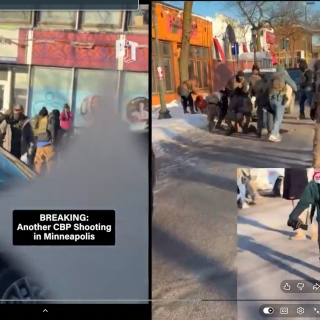“No Rail, No Vote” was recently posted to r/Columbus Reddit, foreshadowing a potential grassroots effort to derail the Central Ohio Transit Authority (COTA)’s November 0.75 percent sales tax levy for rapid transit bus corridors or Bus Rapid Transit (BRT).
The LinkUS Mobility Initiative is the billion(s) dollar plan to increase Columbus’s public transit mobility options other than motor vehicles so to address the huge population spike regional leaders are predicting over the next twenty to thirty years. Estimates have varied widely, from $2 to $8 billion, on what the final LinkUS cost to taxpayers will be.
Initiated in 2020 by both COTA and the Mid-Ohio Regional Planning Committee (MORPC), the plan has designs on five Columbus corridors, such as West Broad and Olentangy River Road.
“The innovative approach will include high-capacity advanced rapid transit, bikeways, green space, roadways, pedestrian improvements, and development along key regional corridors throughout the region,” states the City’s LinkUS Mobility Initiative web page.
With the vote just a few months away – and the Mayor and City Council’s proven ability to get their way – the future of our main corridors could be dominated by “accordion buses” or “tandem buses,” COTA buses with an extra bus hitched on the back that are 60-feet long and can seat 120 passengers.
But now opposition to the LinkUS levy could be mobilizing. The Reddit post gave the potential movement a name, “NoBRT614.” The Free Press sent a media request to an NoBRT614 email given in the post but have yet to hear back.
The “No Rail, No Vote” Reddit post stated:
“Andrew Ginther and the Central Ohio Transit Authority are going to ask you to vote on #LinkUS for Bus Rapid Transit in Columbus. While (we) are for better public transit, this is not the way. Getting rid of car lanes for more buses is a fallacy at best… They want taxpayers to waste their money on a project that is essentially putting a band-aid on a compound fracture.”
The post went on to say Columbus needs to do two things to improve and become a hub in the Midwest.
“We need to build up and not out. Transform downtown into something special that can accommodate many lives while remaining truly Columbus.
Most importantly, we need rail infrastructure, whether underground or elevated. We need to plan and spend for the future before it becomes even more expensive and costly to Columbus taxpayers. Rail transit is what separates A-tier cities from D-tier ones. The more we rely on buses, the more we will remain the latter. If Cleveland can have rail transit, then Columbus has no excuses.”
Opposition to the post was fast and furious. Cycle Cbus on Twitter (@CycleCbus), a definitive source advocating for more biking, bike lanes and bikers’ safety for Columbus, called NoBRT614’s idea a no-brainer in a literal sense.
“I am a big supporter of bringing local passenger rail back to Columbus, but this is one of the dumbest things I’ve read on the subreddit. A great example of letting perfect be the enemy of good. Reads like bad satire at points,” stated Cycle Cbus, adding, “Like they just completely ignore all the other active transit infrastructure and bus service improvements that are part of LinkUS. And what is ‘truly Columbus’? Should we build rail? Yes. Are we? No, so let’s do the next best thing.”
The LinkUS vote is closely related to “Zone In” – the City’s massive zoning code overhaul to create more density (taller condo and apartment buildings).
“I would love to get rail, but this is an awful take,” stated another response to the NoBRT614 Reddit post. “There isn’t federal money for rail at our current density. The ongoing zoning code redevelopments should eventually address this but on the time scale of decades. In the meantime, the BRT and other system improvements proposed with LinkUs is going to basically double the effectiveness of COTA, which would be a huge win. Voting ‘No’ just means we keep it as-is (which as anyone who takes COTA regularly knows is bad-to-somewhat-adequate depending on your route), not that we ever get rail.”
Supporters of rail also chimed in on Reddit, but they too called the idea foolish for Columbus.
“Hey, we’re fans of rail too! But we don’t qualify for federal funding based on our current density. There’s also ridership projections that go into the equation and one way to increase ridership is by offering better service. Not only will LinkUS have the rapid transit corridors but overall service will increase 45 percent compared to 2019 levels. That will not only mean more lines with better frequency but also several lines that have 24 hour service.
Bus Rapid Transit (BRT) can be very effective, especially with several lines. Minneapolis, a city that already has two light rail lines, wants to expand beyond its current five BRT routes and become the ‘Bus Rapid Transit Capital of North America.’ Adding BRT and improved service would be a big win for improving public transportation in Columbus.”
Southside activist and former area commissioner, Bruce Miller, who has also kept a keen eye on COTA for many years, believes COTA is not up to the task of implementing LinkUS, or any form of BRT, and not worthy if the levy were to pass.
“The first thing that needs to be done is to fire the entire board of directors and entire management staff of COTA,” he wrote on a recent LinkUS post to its Facebook page. “As a former area commissioner, they are totally out of touch with community needs and live in an artificial reality world. Any request made of COTA to assist local communities is always met with a resounding NO. COTA doesn’t compromise or understand flexibility. It’s always their way.”
Miller continues, “The second thing that needs to be done is an outside independent audit of COTA’s current revenue stream and expenses. They spend money on idiotic items like drunken sailors.
“The final item is that a citizen advisory board of actual COTA riders needs to have direct input as to the daily operations. Not handpicked Ginther lackeys who have never been on a bus. Once that is all accomplished, I think you will find that COTA won’t need the tax increase. The funds are already there.”



